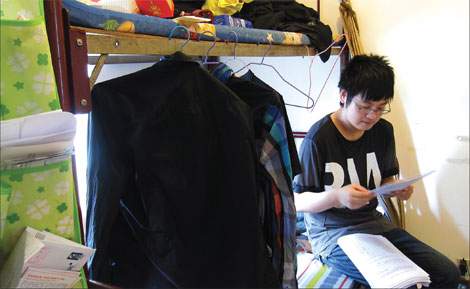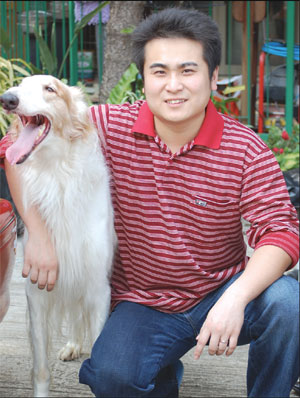The alienated lives of drifters
Updated: 2010-07-24 06:20
By Michelle Fei(HK Edition)
|
|||||||||
|
Ian Yeung, a current HKBU postgraduate student, studies at his apartment in City One Shatin, sitting on his rusty iron bunk-bed. Provided to China Daily |
They are talented young mainlanders who have come to work and study in Hong Kong. The SAR government believes these young people are critical to the city's future. But in the end, few of the mainlanders are willing to stay for long, driven away by what they see as a lack of culture, the high cost of living and their sense of alienation in a city where the walls seem to be closing in. Michelle Fei reports.
"Welcome to the drifter's home," said Ian Yeung self-deprecatingly as he opened the door to his apartment.
Yeung, a 23-year-old mainlander, is studying for his master's degree at Hong Kong Baptist University (HKBU).
Googling "Hong Kong drifter" in Chinese elicits some 1,300,000 returns. "Hong Kong drifter" is the local equivalent for "Beijing drifters", a term used to describe non-local young intellectuals who flock to Beijing to build up their careers. "Hong Kong drifter" refers to mainland youth who come here with big ambitions, to study or work. Some do OK. Others fail. They come and go, coloring the city with their youthful enterprise and exuberance.
Yeung left behind a comfortable life in his hometown of Chongqing, traveling to Hong Kong in 2009 to join some 10,000 other mainland youth.
In the middle of the living room of what passes as the home he shares with three others sits an old square table and three unmatched chairs. The handkerchief-sized living room of the 300-square-foot two-bedroom apartment felt overtaken by the table, a plastic wardrobe and a rusted iron bunk-bed which Ian shared with another mainland student surnamed Wang. Five measured steps across the living room are two tiny bedrooms, occupied by two mainland girls.
The full perspective of the place can be taken in at a glance. This was not a "home" in any sense of the word. Such is the lifestyle of the Hong Kong drifters, bent on meeting fresh challenges and looking for self-improvement.
|
Cai Chun-hui, admitted to the HKBU undergrad program in 2002, now holds a PhD and is a newly established permanent Hong Kong resident. Provided to China Daily |
The track of these "pioneers" can be traced back to 1998, when a group of top students from the mainland were admitted to Hong Kong universities. The landmark event was made possible when the Hong Kong Jockey Club made a HK$100 million donation.
Today, Hong Kong actively seeks out mainland youth with promising futures. These young people are seen as vital to the city's future prosperity - and an infusion on new blood in a city with a rapidly ageing population and a declining birth rate.
The SAR government since 1998 has adopted immigration policies intended to attract more mainland talent.
In August 2001, Immigration Arrangements for Non-local Graduates (IANG) was enacted. It targeted mainland graduates who had obtained a degree or higher qualification at a full-time and locally-accredited program in Hong Kong.
By March of 2007, some 1,078 qualified mainland graduates were living and working in Hong Kong under the policy and the annual compound growth rate among mainland students in Hong Kong grew to 30 percent, according to the Annual Employers Report on the Development of Mainland Talents in Hong Kong (2007-08). The study was carried out by the Hong Kong Association of Mainland Graduates (HKAMG).
Cai Chun-hui, a beneficiary of the 2001 IANG policy, came to Hong Kong in Jan 2002 to study a Bachelor program in Hong Kong Baptist University with scholarships valued at HK$267,000.
Speaking about the policy, he was appreciative of the benefits he had obtained but he added there have been considerable difficulties. "My mainland classmates all were under huge pressure in job hunting as we were only allowed to stay in Hong Kong for three months after graduation," says Cai, who now holds a PhD and is a permanent Hong Kong resident.
Restrictions for mainland youth studying and working in Hong Kong have been relaxed since May 19, 2008. Successful applicants under the IANG may be granted 12 months' stay after graduation.
As policy obstacles diminished, the employment rate of mainland graduates remained low. Research conducted by HKAMG revealed that more than 90 percent of the mainland students express their wish to work in Hong Kong after graduation, but less than 18 percent find jobs.
"Employers often feel reluctant to hire mainland graduates as they don't want to be bothered by the relatively complicated visa applying procedure," says Cai.
The language barrier is another commonly considered challenge among mainland graduates as they often find it hard to communicate with their boss or colleagues, not to mention their clients.
However, Geng Chun-ya, chairman of HKAMG, thought the communication problem should never be an excuse. "Language differences would not necessarily block communicating, it's all about your attitude, about whether you are determined to take the initiative to learn the culture of the society and to immerse into the society," says Geng.
Geng also valued mainland graduates as "the most cost-effective labor", citing that "they are young, they are well-educated, they are hard-working, and most importantly, they are cheap."
On the other hand, another noticeable trend is that, among the limited numbers among this "most cost-effective labor" that managed to find jobs in Hong Kong, most have left or plan to leave the SAR after a few years' working experience, according to Chen Xiao-wei, president of the HKBU Postgraduate Association (2008-09). Chen remarked that this might be due to the extremely high living cost in Hong Kong, especially the sky-high property prices.
"With two to three years' working experience in Hong Kong, I can find a well-paid job on the mainland with the same amount of salary Hong Kong offers me, then why should I stay in Hong Kong wasting my money instead of moving to a cheaper place?" argues Chen.
Besides the cost of living, there is a sense of not belonging that nettles the "Hong Kong drifters".
"Hong Kong lacks its own culture, and that's why people often come and go, taking advantage of the procedure but hardly settling down here," says Qiu Yue, who graduated from Lingnan University in 2006 and a current staff member of Wonderful Sky Financial Group Limited. She will become a Hong Kong permanent resident this year yet she plans to leave the SAR right after that.
The so-called "poor city culture" problem may contribute to the sense of alienation among young mainlanders living here. What bothers the mainlanders even more is the relationship issue, according to HKAMG Chairman Geng.
"After a few years' working in Hong Kong, they will grow to a marriageable age and then the relationship issue or the marriage issue will loom quickly and become a major concern for mainland youth," adds Geng.
"My friends all found it almost impossible to find a boyfriend in Hong Kong," says Ye Dan, who has worked as an insurance broker since her graduation from the Department of Finance and Insurance, Lingnan University in 2006. She observes that young Hong Kong men share little in common with mainland young women. "Hong Kong drifters" are said to be either too independent minded or too realistic.
At a dating party held by HKAMG to alleviate the "relationship crisis", over 100 mainland single women attended while less than 20 bachelors presented. "The serious imbalance in sex ratio among mainland youth in Hong Kong is the crux of the problem," concludes Geng.
Nevertheless, little effort can be made to change the imbalanced sex ratio symptom or to solve the relationship issue. An association of mainland youth, which could bring them together and concerned about their welfare, might help strengthen their sense of belonging in the SAR, according to Chen Xiao-wei, the student association leader.
Recently, the first non-profit association of mainland migrants, New Family, was founded by Hui Wing-mau, founder and chairman of Shimao Property Holdings Ltd, vowing to offer one-package help to new-coming mainland migrants to help them adapt to the new environment as soon as possible.
"Though we are living in kind of 'Dwelling Narrowness' condition right now, but there's a huge space for our career development outside," says Ian Yeung, with hopeful expression in his eyes.
|
Chen Xiao-wei, President of HKBU Postgraduate Association (2008-09) and now studying PhD in Computer Science in HKBU, enjoys himself at Port Shelter. Provided to China Daily |
(HK Edition 07/24/2010 page2)


